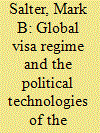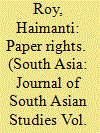| Srl | Item |
| 1 |
ID:
071964


|
|
|
|
|
| Publication |
2006.
|
| Summary/Abstract |
This article examines the micropolitics of the border by tracing the interface between government and individual body. In the first act of confession before the vanguard of governmental machinery, the border examination is crucial to both the operation of the global mobility regime and of sovereign power. The visa and passport systems are tickets that allow temporary and permanent membership in the community, and the border represents the limit of the community. The nascent global mobility regime through passport, visa, and frontier formalities manage an international population through and within a biopolitical frame and a confessionary complex that creates bodies that understand themselves to be international. The author charts the way that an international biopolitical order is constructed through the creation, classification, and contention of a surveillance regime and an international political technology of the individual that is driven by the globalization of a documentary, biometric, and confessionary regime. The global visa regime and international borders are crucial in constructing both international mobile populations and international mobile individuals.
|
|
|
|
|
|
|
|
|
|
|
|
|
|
|
|
| 2 |
ID:
145457


|
|
|
|
|
| Summary/Abstract |
This essay contextualises the emergence of a document regime which regulated routine travel through the deployment of the India–Pakistan Passport and Visa Scheme in 1952. It suggests that such travel documents were useful for the new Indian state to delineate citizenship and the nationality of migrants and individual travellers from Pakistan. The bureaucratic and legal mediations under the Scheme helped the Indian state to frame itself before its new citizens as the sole certifier of some of their rights as Indians. In contrast, applicants for these documents viewed them as utilitarian, meant to facilitate their travel across the new borders. The contrast and contestation between such different perceptions helps us to understand the continued significance of documentary identities in contemporary India.
|
|
|
|
|
|
|
|
|
|
|
|
|
|
|
|